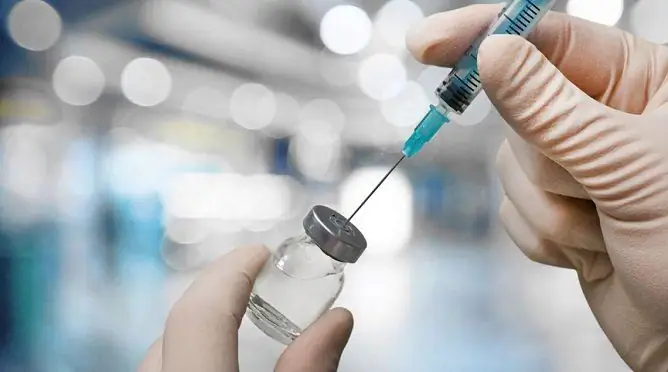- Author Rachel Wainwright wainwright@abchealthonline.com.
- Public 2023-12-15 07:39.
- Last modified 2025-11-02 20:14.
Pneumo 23
Pneumo 23: instructions for use and reviews
- 1. Release form and composition
- 2. Pharmacological properties
- 3. Indications for use
- 4. Contraindications
- 5. Method of application and dosage
- 6. Side effects
- 7. Overdose
- 8. Special instructions
- 9. Application during pregnancy and lactation
- 10. Use in childhood
- 11. Use in the elderly
- 12. Drug interactions
- 13. Analogs
- 14. Terms and conditions of storage
- 15. Terms of dispensing from pharmacies
- 16. Reviews
- 17. Price in pharmacies
Latin name: Pneumo 23
ATX code: J07AL02
Active ingredient: vaccine for the prevention of pneumococcal infections
Producer: Sanofi Pasteur (France)
Description and photo update: 2018-26-10

Pneumo 23 is a vaccine for the prevention of pneumococcal infection.
Release form and composition
Dosage form - solution for intramuscular and subcutaneous administration: clear, colorless liquid [1 dose (0.5 ml) in a 1 ml glass syringe with a chlorobromobutyl plunger and a fixed needle closed with a protective cap; each syringe is placed in a closed cell package (blister), 1 package in a cardboard box].
Composition of 1 dose of the vaccine:
- active substances: purified capsular polysaccharides of Streptococcus pneumoniae 23 serotypes: 1, 2, 3, 4, 5, 6B, 7F, 8, 9N, 9V, 10A, 11A, 12F, 14, 15B, 17F, 18C, 19A, 19F, 20, 22F, 23F, 33F - 0.025 mg each;
- additional components: sodium hydrogen phosphate dihydrate, sodium dihydrogen phosphate dihydrate, sodium chloride, water for injection, phenol (preservative).
Pharmacological properties
Pharmacodynamics
The active ingredient of the drug is purified polysaccharides of 23 serotypes of Streptococcus pneumoniae pneumococcus, which accounts for at least 90% of all serotypes that can cause invasive pneumococcal infections.
The nature of the immune response to vaccine administration is T-independent. In children under 2 years of age, it is characterized by low immunogenicity and the absence of the effect of revaccination after repeated injections.
Specific immunity develops 2-3 weeks after vaccination.
According to the immunogenicity studies of Pnevmo 23, the overall epidemiological efficiency in preventing the development of infections caused by serotypes contained in the vaccine is 57% [95% confidence interval (CI) - 45-66%].
The effectiveness of immunization in patients with various diseases:
- diabetes mellitus - 85% (95% CI - 50-95%);
- anatomical asplenia - 77% (95% CI - 14-95%);
- chronic lung diseases - 65% (95% CI - 26-83%);
- congestive heart failure - 69% (95% CI - 17-88%);
- ischemic heart disease - 73% (95% CI - 23-90%).
Efficiency in immunocompetent elderly patients (over the age of 65 years) - 75% (95% CI - 57-85%).
According to studies, the effectiveness does not decrease as the time after vaccination increases: after 5-8 years it is about 71% (95% CI - 24-89%), after 9 years or more - 80% (95% CI - 16-95 %).
The epidemiological efficacy of Pneumo 23 in chronic renal failure, cirrhosis, alcoholism, leukemia, lymphoma, myeloma and sickle cell anemia was not determined, which is due to the small sample size in these groups.
Antibody titers ≥ 300 ng / ml after immunization were achieved in at least 84% of the subjects for 21 serotypes out of 22, of which 100% of the vaccinated - for 16 stereotypes, in 65% - for the 9N stereotype. In addition, due to serotype 6B, the vaccine also stimulated the production of antibodies to serotype 6A: in 90% of non-immune patients at least two-fold seroconversion was achieved, with an average increase in antibody titer of 5.4 times.
Pneumo 23, according to research data, is ineffective for infections caused by pneumococcal serotypes, which are not present in the vaccine (95% CI of epidemiological effectiveness - from -73 to 18%; p ~ 0.15).
Indications for use
According to the instructions, Pneumo 23 is used in people at risk for the specific prevention of pneumococcal pneumonia and generalized pneumococcal infections caused by Streptococcus pneumoniae serotypes presented in the vaccine.
The risk group includes:
- elderly people over the age of 65;
- persons with a weakened immune system: nephrotic syndrome, chronic renal failure, lymphoma, Hodgkin's disease, multiple myeloma, sickle cell anemia, absence or dysfunction of the spleen, hematological cancer, organ transplantation;
- people with chronic diseases: diabetes mellitus, cirrhosis, alcoholism, lung disease, cardiovascular disease, etc.;
- patients with cerebrospinal fluid leakage;
- patients with HIV infection (including asymptomatic);
- people who are in special institutions for the care of the disabled or the elderly, or work in conditions of an increased risk of pneumococcal infections or their complications, or are in organized groups (living in hostels, military personnel, students).
Contraindications
- children under 2 years old;
- exacerbation of chronic diseases;
- acute diseases (both infectious and non-infectious);
- an allergic reaction to the previous administration of the pneumococcal vaccine or to any of the components contained in the vaccine.
Instructions for use Pneumo 23: method and dosage
Vaccine Pneumo 23 is intended for subcutaneous or intramuscular administration. The more preferred route is intramuscular. It is forbidden to inject the drug into the vascular bed, therefore, before injecting the solution, make sure that the needle does not enter the blood vessel. To do this, the piston must be pulled back a little and inspect the syringe barrel, there should be no blood in it.
For primary immunization, one dose of Pnevmo 23 (0.5 ml) is administered.
With revaccination, a single administration of a single dose is also indicated.
The vaccine must be warmed to room temperature before administration, keeping it for a few minutes after being removed from the refrigerator.
Shake the drug immediately before injection.
Within 30 minutes after injection, the patient must be under medical supervision. The office should be provided with anti-shock therapy.
Between the injections of Pneumo 23 or Pneumo 23 and any other pneumococcal polysaccharide vaccine, intervals of at least 3 years should be observed.
Side effects
Pneumo 23, like any other biologically active drug, often causes:
- soreness, swelling, redness, or induration at the injection site. These reactions are moderately expressed and pass quickly;
- an increase in body temperature (in some cases more than 39 ° C) on the day of vaccination for up to 24 hours.
In very rare cases, pronounced local reactions occur. They develop, as a rule, in people with a high level of antipneumococcal antibodies, are reversible, and pass without any complications and consequences.
In individual cases, it is possible: inflammation of the subcutaneous tissue at the injection site, headache, fatigue, malaise, myalgia, arthralgia, lymphadenopathy, urticaria, rash, Quincke's edema, anaphylactic reaction, including shock, febrile convulsions.
There are isolated reports of the occurrence of peripheral edema of the limb into which the vaccine was administered.
The patient should be warned that all adverse reactions, including those not listed in the instructions, must be reported to the attending physician.
Overdose
The vaccine is administered by a medical professional in a hospital setting. The syringe contains only one dose, so overdose is not possible.
special instructions
If splenectomy or immunosuppressive therapy (such as chemotherapy) is required, vaccination should be given at least 2 weeks in advance.
If the vaccine is administered during immunosuppressive therapy, the immune response decreases, so vaccination should be postponed until the course of treatment is completed. The exception is people with chronic immunodeficiency (for example, with HIV infection) - in this case, the introduction of Pneumo 23 is still recommended, even when expecting a decrease in the immune response.
Due to the increased risk of hematoma formation with intramuscular administration, the drug is used with extreme caution in patients with bleeding disorders (hemophilia or thrombocytopenia) and people receiving anticoagulants. In children with hemophilia, the risk of bleeding is increased with intramuscular injection, therefore, the Pneumo 23 vaccine should be injected subcutaneously into the area where you can press the site of infection, with the support of coagulation factors.
Influence on the ability to drive vehicles and complex mechanisms
No studies have been conducted on the effect of Pnevmo 23 on the ability to drive vehicles and other mechanisms.
Application during pregnancy and lactation
Due to limited experience, Pneumo 23 is not recommended for use during pregnancy.
Whether the components of the drug are excreted in breast milk is unknown.
In each case, the doctor makes a decision on vaccination individually, after assessing the real danger of pneumococcal infection and the possible risks associated with the introduction of Pneumo 23. The use of the drug is possible only if clearly necessary, if the benefits to the woman outweigh the potential risks to the fetus / child.
Pediatric use
Pneumo 23 can be used to vaccinate children from 2 years old. In children under 2 years of age, the nature of the immune response to the administration of the drug is characterized by low immunogenicity and no effect during revaccination.
Use in the elderly
Elderly people over 65 years old are at risk of developing pneumococcal pneumonia and generalized pneumococcal infections, therefore, at this age, vaccination with Pneumo 23 is recommended for specific prophylaxis.
Drug interactions
On the same day as Pnevmo 23, the introduction of other vaccines is allowed, but with different syringes and in different parts of the body, with the exception of the vaccine for the prevention of tuberculosis.
Immunosuppressive drugs reduce the immune response to vaccine administration, therefore, vaccination is recommended after the end of immunosuppressive therapy.
The patient should be informed about the need to inform the doctor about all medications taken that coincide in time with vaccination or preceding immunization.
Analogs
The analogues of Pneumo 23 are: Pneumovax 23, Prevenar, Prevenar 13, Synflorix.
Terms and conditions of storage
Shelf life is 2 years.
Store in a dark place at a temperature of 2-8 ° С. Do not freeze. Keep out of the reach of children.
Terms of dispensing from pharmacies
Dispensed by prescription.
Reviews about Pneumo 23
Reviews about Pneumo 23 are mostly positive. Patients confirm the high efficacy of the drug when it is used correctly according to indications. An additional advantage is the long term of validity - from 3 to 5 years. Many people consider the disadvantage of the vaccine to be the age limit for its use (due to its very low effectiveness), and it is children under 2 years of age who are perhaps the most susceptible to pneumococci.
Common negative statements about Pnevmo 23 mainly contain complaints about side effects and a rather high price for those who are not shown free vaccination in public clinics.
There are isolated negative reviews of people who gave this vaccine to their often ill children. In them, they describe the child's difficult tolerance of vaccination, manifested by soreness and swelling at the injection site, fever up to 39.5 ° C, capriciousness. At the same time, according to the parent, there was no effect of immunization.
Price for Pnevmo 23 in pharmacies
The average price for Pnevmo 23 in the pharmacy chain is 2,100 rubles per dose.

Anna Kozlova Medical journalist About the author
Education: Rostov State Medical University, specialty "General Medicine".
Information about the drug is generalized, provided for informational purposes only and does not replace the official instructions. Self-medication is hazardous to health!






